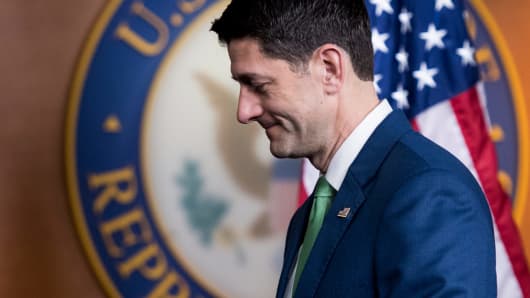House members are leaving their seats at a rate not seen in at least a dozen years. Yet it remains to be seen how the exodus — particularly on the Republican side — will affect November's fight for control of the chamber.
The most high-profile departure came earlier this month when House Speaker Paul Ryan said he would not seek re-election as he tries to spend more time with his family.
GOP incumbents will not run in 39 districts: 26 in which the member of Congress is retiring and 13 in which the representative is seeking a different office, according to data compiled by Daily Kos Elections. Nineteen Democratic seats will be open due to retirements, campaigns for another office and one death.
The current total of 58 open seats has already topped every election cycle dating back to 2006, according to the Daily Kos data. Tough electoral dynamics for some Republicans and term limits on committee chairmanships have contributed to the high number of departures.




